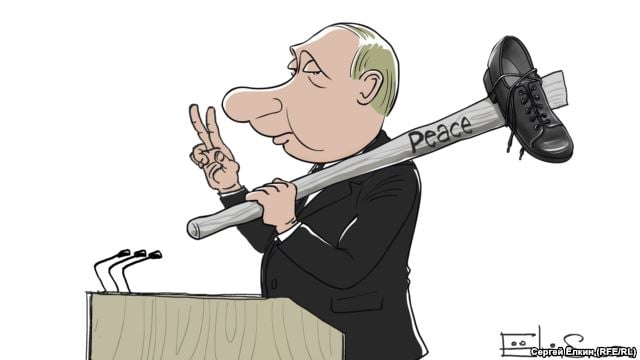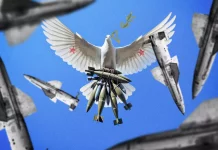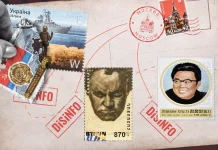
Dmitry Medvedev recently played a telling little head game.
When the Russian prime minister said at the Munich Security Conference that Moscow and the West had “slid into a new Cold War,” he essentially created a damned-if-you-do-damned-if-you-don’t situation, Brian Whitmore wrote for RFE-RL.
“If the West agrees that it is a new Cold War, then it automatically acknowledges Russia’s global-power status. If it doesn’t — then why the sanctions? — Can we lift them now? Can we go back to business as usual?” Anton Shekhovtsov, a fellow at the Legatum Institute, wrote recently on his Facebook page.
As is often the case, Shekhovtsov is right on target. And Medvedev’s rhetorical trick is something of a metaphor for Russia’s behavior writ large — and it has implications beyond the cute little mind games Vladimir Putin’s favorite mini-me played in Munich.
“With his choice of words, the prime minister is pursuing the same goal as the Russian fighter planes that are shadowing German Tornado reconnaissance jets over Syria or operating near the airspace of NATO member states,” German foreign-affairs commentator Mathieu von Rohr wrote recently in Der Spiegel.
“They are gestures aimed at intimidating the West against trying to counter Russian aspirations to power.”
Actually, it’s more subtle and more insidious than outright intimidation.
Manipulate Your Superiors
This game is called “reflexive control,” a doctrine developed by Soviet military strategists back in the 1960s that aims to compel adversaries to behave in a manner advantageous to Moscow.
It does this by preemptively shaping of the environment through disinformation campaigns, psyops, business ties, political meddling, establishing military facts on the ground — or any combination of the above.
It’s a game that anybody who has ever dealt with a manipulative teenager — or adult for that matter — will recognize. And it’s a game that Putin’s Kremlin has been playing with the West in ways big and small for years.
It has forced the West to treat Russia like part of the solution in Ukraine and Syria, when in reality, Moscow is a big — or in the case of Ukraine, the biggest — part of the problem.
It has compelled Europe to tread lightly with Putin, even as the Kremlin exacerbates the continent’s migrant crisis and backs the xenophobic parties that are exploiting it.
And it has nudged the United States toward reluctantly treating Russia like the rival superpower it longs to be.
“The idea behind reflexive control is to shape the environment in such a way that the enemy chooses Russia’s preferred course of action voluntarily, because it is easiest and all the others appear much more difficult and risky, if not impossible,” military analysts Frederick and Kimberly Kagan wrote recently.
“Reflexive control allows a much weaker force to constrain and even control the activities of a much stronger force.”
Forcing Bad Choices
Russia’s intervention in Syria, its relentless bombing campaign in Aleppo, and its creative interpretations of the cease-fires it signs are textbook examples.
By creating military facts on the ground with one hand while pushing for a diplomatic solution with the other, Moscow has effectively hamstrung Western efforts to remove Bashar al-Assad.
As foreign-affairs analyst Frederic C. Hoff of the Atlantic Council noted recently, the Kremlin is “trying hard to force upon the United States a binary choice” between Assad and the Islamic State extremist group “by eliminating militarily all alternatives to the twin wreckers of Syria.”
Moreover, by indiscriminately bombing civilian targets, Russia is exacerbating Europe’s refugee crisis. And in doing so, it has sent a message to Brussels that things will only get better once relations with Moscow are normalized and sanctions are lifted.
And if Europe doesn’t play ball? Well, this is where reflexive control becomes outright extortion.
“If this wave of humanity — some of it terrified, some of it simply disgusted — enables the political bottom-feeders of Western Europe to rise to the top, will this not serve the purposes of Mr. Putin?” Hoff wrote.
Russia has also played the reflexive-control game in Ukraine, which defense analyst Can Kasapoglu called a “laboratory” for the technique in a recent research note for the NATO Defense College.
Moscow managed to prevent the authorities in Kyiv from offering any resistance to the forceful annexation of Crimea, it has kept the West confused about its troop levels and military goals in Donbas, and it has gotten itself recognized as a signatory of the Minsk cease-fire, but not as a combatant in the conflict in eastern Ukraine.
“Moscow has used this technique skillfully to persuade the U.S. and its European allies to remain largely passive in the face of Russia’s efforts to disrupt and dismantle Ukraine through military and nonmilitary means,” Maria Snegovaya wrote in a recent report for Institute for the Study of War.
She added that Kremlin has also “sowed discord within the NATO alliance and created tensions between potential adversaries about how to respond.”
The Limits Of Extortion
Reflexive control has also had its limitations, as it has thus far not prevented the West from imposing, and maintaining, sanctions that are helping cripple the Russian economy.
And as Western elites become increasingly aware of what Moscow is doing — and how they are doing it, these tactics “will return to haunt Moscow,” Maksim Trudolyubov, editor at large of the Russian daily Vedomosti, wrote in The New York Times.
“The Kremlin can change facts on the ground, stage quasi cease-fires and create zones of influence to exert pressure on other nations. It has done so in Moldova, Georgia and Ukraine, and the pattern is now being repeated in Syria,” Trudolyubov wrote.
“But if you have the reputation of turning everything you touch into a weapon, everything you say and do might be construed as an attack. You become everyone’s enemy. Russia’s leaders have become so adept at their game of projecting menacing ambiguity that it is now impossible for them to persuade anyone that sometimes the Russians might just simply want to do business.”
By Brian Whitmore, RFE-RL





